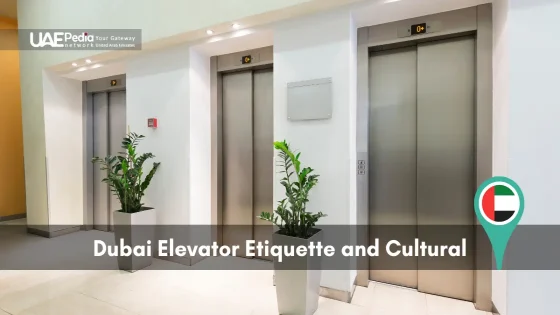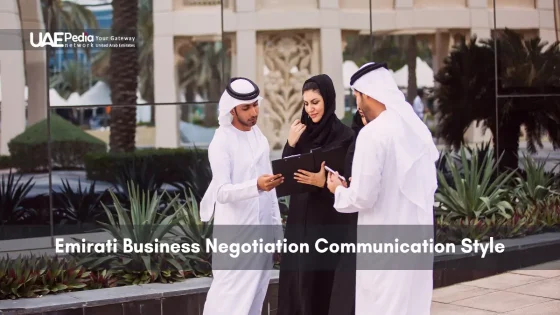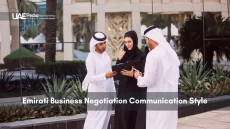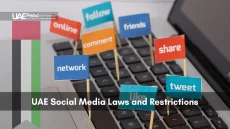Did you know nearly 9 out of 10 people you’ll meet here are expats? This melting pot creates a fascinating dance between global ambition and Emirati heritage—especially in spaces as everyday as office buildings. How we move through these shared areas speaks volumes about cultural awareness.
In this crossroads of innovation and tradition, small gestures carry weight. Something as simple as which hand you use to offer a business card—or how you navigate quiet moments during Ramadan—can build trust or create unintended friction. It’s less about strict rules and more about tuning into the rhythm of respect that defines life here.
We’ve all seen visitors fumble with loud conversations in elevators or miss cues about personal space. But here’s the good news: once you understand the why behind these norms, they feel natural. This guide strips away the guesswork, blending practical tips with cultural context so you can focus on what matters—building genuine connections.
- Cultural sensitivity isn’t optional in a nation where most residents grew up elsewhere
- Everyday spaces reveal how tradition shapes modern business interactions
- Practical awareness (like right-hand preferences) becomes second nature with guidance
Grasping Dubai’s Cultural Landscape
Here’s the thing: only 20% of people you’ll work with here grew up in the UAE. The rest? A vibrant mix of over 200 nationalities—engineers from Mumbai sharing coffee with designers from Milan, all under the call to prayer echoing through glass towers. This isn’t just diversity; it’s a living lab of global collaboration shaped by Emirati hospitality.
Where Sand Meets Silicon
We’ve seen tech startups host brainstorming sessions in majlis-style lounges—low cushions meeting high-speed Wi-Fi. Business thrives when tradition guides innovation. Did you know many offices adjust schedules around prayer times? Or that meetings pause during Ramadan’s sunset iftar meals? These aren’t hurdles—they’re bridges to trust.
The Unspoken Rules of Engagement
- Who enters a room first? Seniority matters, but age often trumps titles
- Handshakes last longer here—use your right hand, always
- Local events like National Day (December 2) spark city-wide celebrations—join in!
One CEO friend puts it best:
“In the Middle East, relationships are the currency. Learn the rhythm—when to pitch ideas, when to sip karak chai and listen.”
We’ll show you how to blend boardroom polish with souq-smart savvy. Because here, cultural IQ isn’t just nice—it’s necessary.
Read More:
Navigating Social Etiquette in Dubai Elevators
Shared spaces here become classrooms in cultural fluency—even a 30-second lift ride teaches volumes. We’ve watched visitors transform from awkward shufflers to confident connectors by mastering a few key moves. Let’s decode the silent language of these glass-and-steel capsules.
Movement as Respect
Ever seen someone block a doorway? Locals don’t. Let others exit first—it’s like holding a door open back home, but with extra intention. A consultant friend once joked: “Rushing in screams ‘me first’ louder than any words.” Stand to the right if you’re riding multiple floors, freeing space for quick exits.
Hands Speak Louder
That viral video of Bella Hadid’s left-handed greeting mishap? It wasn’t about her fame—it spotlighted a core value. Your right hand holds coffee, shakes hands, passes documents. Why? In Islamic tradition, the left serves hygiene purposes. Swap hands mid-action? Locals notice but won’t scold—they’ll just mentally note your awareness.
Feet matter too. Leaning against walls might flash your soles—a major insult here. Keep shoes planted flat. And save loud phone chats for later; soft tones maintain the communal calm.
Timing Is Everything
Five daily prayer times mean elevators get busier 30 minutes before adhan calls. If you see colleagues checking watches, offer to press “hold.” During Ramadan, avoid eating or drinking—even gum—in these shared zones. One tech CEO told us: “It’s not about rules—it’s showing you’re tuned into our rhythm.”
Westerners often joke about “elevator small talk.” Here? A smile and nod work better. Your silence isn’t cold—it’s considered polite restraint. Master these unspoken codes, and you’ll glide through interactions as smoothly as Burj Khalifa’s express lifts.
Dubai Elevator Etiquette Cultural Norms
In a city where skyscrapers brush the clouds, even elevator rides become cultural exchanges. A New York executive once told us: “Back home, we check phones. Here, I watch hands.” This shift reveals how confined spaces magnify cultural differences—and why your gestures matter more than words.
Hands That Speak Volumes
Western visitors often forget: the right hand reigns supreme. When a European diplomat recently passed documents with their left, locals perceived it as unintentional rudeness. Why? Tradition links the left to hygiene routines. Use it for handshakes or exchanges, and you’ll confuse colleagues—even if they’re too polite to mention it.
East Meets West in 60 Seconds
Compare these scenarios:
| Gesture | Local Expectation | Western Common Practice |
|---|---|---|
| Personal Space | Stand at arm’s length | Close proximity acceptable |
| Eye Contact | Brief, respectful nods | Sustained engagement |
| Attire | Modest necklines/sleeves | Business casual common |
A Dubai hotel manager shared:
“Guests from Texas often joke about our ‘elevator ballet.’ But when they mirror our moves? Instant rapport.”
Dress code tells its own story. While Londoners might rock jeans to high-rises, tailored suits or abayas signal professionalism here. Even your watch matters—flashing luxury brands can feel showy compared to understated elegance.
Three quick tips for smooth rides:
- Carry bags in your left hand—keeps the right free for greetings
- Angle shoulders slightly—avoids accidental contact
- Save jokes for later—smiles speak louder here
These activities aren’t about strict rules. They’re invitations to show you value local business culture. Master them, and you’ll navigate vertical spaces like someone who understands the world isn’t flat—in more ways than one.
Aligning with Islamic Practices and Prayer Times
Time bends differently here—not by minutes, but by moments of reflection. Five times daily, the adhan (call to prayer) shifts the city’s rhythm. Offices adjust schedules, malls quieten briefly, and streets hum with renewed purpose after each pause. This isn’t disruption—it’s harmony.
Scheduling Your Day Around the Five Daily Prayers
Business hours often align with prayer intervals. Meetings rarely start during Fajr (dawn) or Maghrib (sunset). A project manager at a tech firm shared:
“We block calendars 15 minutes before each prayer—it’s like hitting ‘refresh’ for focus.”
| Prayer | Typical Time | Business Impact |
|---|---|---|
| Fajr | Pre-dawn | Offices open after |
| Dhuhr | Midday | Lunch breaks adjust |
| Asr | Afternoon | Meetings wrap early |
Visitors should download prayer time apps. Pro tip: Schedule video calls between Dhuhr and Asr when local teams are most available.
Adapting Etiquette During Ramadan and Other Religious Events
The holy month transforms routines. Workdays shorten, and fasting (no food/water sunrise to sunset) becomes the norm—even for non-Muslims in public spaces. A marketing exec advised: “Clients appreciate if you avoid lunch meetings then. Offer evening sessions instead.”
Key adjustments during the holy month:
- Business hours shift to ~9 AM–2 PM
- Virtual greetings replace handshakes if hands are busy with dates/water at sunset
- Charity initiatives spike—participating builds rapport
Planning trips? Check our UAE holiday safety guide for dates like Eid al-Fitr. Respecting these patterns isn’t just polite—it’s how trust gets built, one adjusted calendar invite at a time.
Understanding Hand Gestures and Body Language
Your hands might reveal more than your words here. In the UAE’s business culture, nonverbal cues often speak louder than polished pitches. A venture capitalist once whispered to me: “Watch where the CEO’s palms face during introductions—it tells you who holds real influence.”
The Right Hand Rules
Islamic teachings tie cleanliness to the right side—a tradition shaping modern interactions. Use your left to pass a document? Locals see it like offering a coffee cup after changing a tire. Not wrong, just… jarring. We’ve seen deals stall over accidental left-handed card exchanges.
- Greet with your right palm—even if you’re left-dominant
- Accept business cards like prized gifts: right hand only
- Dining tip: Keep your left hand visible on the table, not hidden
Hierarchy whispers through body language too. Notice how junior staff enter a room last? Or how people angle shoulders slightly when superiors speak? These unspoken rules structure every interaction.
“Westerners focus on eye contact. Here, we track hand placement first,”
…shared a hospitality trainer during a workshop. Three quick fixes for smoother exchanges:
- Reposition your phone to the left pocket—frees your dominant hand
- Practice one-handed coffee sips (it’s harder than it looks!)
- When in doubt, mirror others’ gestures
Best avoid crossing arms or pointing—these read as confrontational. Instead, keep palms open when speaking. Time your movements to match the room’s rhythm, and you’ll navigate meetings like someone who gets the hidden order of things.
Navigating Business Interactions in the UAE
In the UAE’s boardrooms, first impressions aren’t just handshakes—they’re silent negotiations. We’ve watched startups win contracts through perfect title usage and seen seasoned executives falter by skipping a greeting order. Your approach here signals whether you’ve done your homework.
The Art of the Introduction
Seniority dictates every move. When meeting officials, greet the highest-ranking person first—even if they’re the quietest in the room. A former ambassador shared:
“Call someone by their first name too soon, and you’ll hear chairs shift.”
Use titles likeSheikhorDr.until invited otherwise. Three steps to ace introductions:
- Offer business cards right-handed—palms up, like presenting a gift
- Wait for elders to initiate handshakes (some may prefer a nod)
- Mention mutual contacts early—it builds instant credibility
Trust-Building in Multicultural Rooms
Government meetings demand formality: suits, printed agendas, minimal jokes. But tech startups? They blend structure with warmth. Notice these contrasts:
| Setting | Formality Level | Pro Tip |
|---|---|---|
| Government Office | High (titles mandatory) | Bring extra copies of documents |
| Private Sector | Moderate (first names after approval) | Share a local coffee order |
Your LinkedIn photo matters more here than elsewhere. Opt for neutral backgrounds and avoid casual shots—it’s not vanity, it’s respect. One HR director confessed: “We Google you before accepting meetings. That desert selfie? Save it for Instagram.”
Watch for subtle cues. Leaning forward shows engagement; checking your phone mid-convo? That’s a relationship killer. Follow this guide, and you’ll navigate the country’s business maze like someone who understands that here, protocol isn’t red tape—it’s the welcome mat.
Adapting Dress Codes and Presentation Standards
Your wardrobe becomes your first handshake here—before you even speak. In UAE business environments, attire balances respect for tradition with global professionalism. A tech founder once joked: “Wear a kandura to a startup pitch? You’ll get nods. Wear shorts? You’ll get stares.”
Visible tattoos or revealing attire can legally prohibit entry to UAE government buildings under public decency laws Ref.: “Dubai Department of Economic Development (2022). Business Attire Regulations. Official Government Bulletin.”
When Tradition Meets Tailoring
Local professionals often choose between crisp suits and flowing Emirati garments. The key? Match your industry’s vibe:
| Attire Type | Common Industries | Key Features |
|---|---|---|
| Traditional Emirati | Government, Education | White kandura (men), black abaya (women) |
| Modern Business | Tech, Finance | Neutral suits, covered shoulders/knees |
A Dubai-based fashion consultant advises:
“Expats don’t need traditional dress—but knowing its significance builds bridges. Notice collars? Many kanduras have hidden embroidery showing personal style.”
Dress Smart, Blend Smoother
Modesty rules apply across settings. Avoid sheer fabrics or tight fits—even in creative fields. Three quick fixes:
- Keep a lightweight blazer handy for surprise meetings
- Choose breathable fabrics for 45°C days
- Swap loud prints for solid colors in conservative places
Westerners often stumble with accessories. That chunky necklace? Fine in New York, distracting here. One HR manager shared: “We’ve seen great candidates lose offers over visible tattoos—not banned, but still debated.”
Your shoes matter too. Polished loafers work better than sneakers outside tech hubs. Dress for the room’s most senior person, and you’ll nail UAE business culture’s unspoken dress code every time.
Recognizing Cultural Differences and Social Hierarchy
Ever notice how some rooms seem to rearrange themselves when certain people enter? In this country, social order flows like invisible currents—reshaping spaces and conversations. A local diplomat once told me: “Here, respect isn’t just earned—it’s woven into how we move.”
Status as Silent Currency
Watch government meetings unfold. The most senior figure always enters last—a reverse of Western norms. Why? It signals their role as decision-maker. Younger professionals learn early: titles like Sheikh or Dr. aren’t formalities. They’re keys to trust.
- Greet the eldest person first, even if they’re not leading the meeting
- In mixed groups, let high-ranking individuals set conversation topics
- When unsure, mirror others’ posture—leaning slightly forward shows engagement
Navigating the Unspoken Ladder
Business lunches reveal hierarchy in action. A tech founder shared:
“I once saw a junior exec pull out a chair for their CEO—only to realize they’d breached protocol. The seat should’ve been offered by the host’s team.”
Three subtle cues that reveal rank:
| Cue | Meaning | Response |
|---|---|---|
| Hand placement | Palms up = openness | Match their gesture |
| Seating position | Center seat = authority | Address them first |
| Greeting order | First to speak = senior | Wait your turn |
Time your actions carefully. Arriving early to events? It might pressure hosts. A measured entrance 5-10 minutes late often works better. Remember—your right hand isn’t just for greetings. Use it to pass documents, accept coffee, or gesture respectfully.
In this culture, every interaction whispers two questions: Who holds honor here? and How can I show I see it? Master that dance, and you’ll navigate social currents like someone who understands the true rhythm of respect.
Timing Interactions: Work Hours and Social Breaks
Ever tried scheduling a meeting only to realize your calendar’s dancing to a different beat? The UAE’s Sunday-to-Thursday workweek catches many newcomers off guard. Add prayer pauses and Ramadan adjustments, and you’ve got a rhythm that rewards preparation.
Sync Your Calendar
Most offices operate 8 AM–6 PM Sunday-Thursday, but check industry norms. Tech startups might stretch hours, while government roles stick to strict schedules. A project manager shared:
“Book morning slots—energy dips after 2 PM during summer months. Always confirm dates against Hijri (Islamic) holidays.”
| Time Consideration | Standard Practice | Ramadan Adjustment |
|---|---|---|
| Meetings | 9 AM–4 PM | 10 AM–2 PM |
| Email Responses | Within 24 hrs | Allow 48 hrs |
| Deadlines | Set for Wednesdays | Avoid Thursdays |
Navigate Daily Rhythms
Five daily prayers create natural pauses. Smart planners avoid booking calls 30 minutes before Dhuhr (noon) and Asr (afternoon). Midday breaks aren’t laziness—they’re cultural resets. Pro tip: Use prayer intervals to review notes or grab karak tea.
- Download apps like Muslim Pro for prayer alerts
- During Ramadan, shift brainstorming sessions to post-Iftar hours
- If unsure, ask: “What time works best for your team?”
Westerners often overlook Friday’s significance—it’s the UAE’s Saturday. One consultant learned the hard way: “I scheduled a Friday call assuming weekends were free. My contact politely rescheduled—twice.”
Check out the below:
Celebrating a Harmonious Blend of Tradition and Modernity
In a skyline where ancient wind towers cast shadows on AI-powered skyscrapers, the Emirates reveals its magic—tradition and progress aren’t rivals here. They’re dance partners. This fusion creates spaces where handwritten Arabic calligraphy hangs beside digital art installations, each telling stories of a nation sprinting toward tomorrow while honoring yesterday.
Respecting local customs isn’t about memorizing rules. It’s about recognizing that centuries-old hospitality shapes today’s innovation hubs. Whether adjusting meeting times for prayer or choosing modest attire, these gestures become bridges—not barriers—to meaningful connections.
Consider this your backstage pass to thriving here. From right-handed greetings to reading silent cues, every tip shared unlocks deeper understanding. The energy of this place lies in its ability to weave Bedouin wisdom into blockchain conferences without missing a beat.
So pack curiosity alongside your laptop. Let tailored suits share suitcase space with sunset desert hike gear. When you embrace both the majlis and the metro, you’ll discover why this blend is considered extremely rewarding—for business, friendships, and unforgettable adventures.
Keep conversations minimal and avoid scheduling meetings near prayer times, especially on Fridays. Elevators in malls or offices may pause briefly as people head to prayer rooms—patience here shows respect for local customs.
The left hand is traditionally considered unclean in many Middle Eastern cultures. Always offer documents, handshakes, or snacks with your right hand—even in casual elevator chats—to avoid unintentional offense.
Opt for modest, tailored outfits. While modern attire is common, avoid sleeveless tops or short hemlines. In government buildings or during Ramadan, lean conservative—think lightweight blazers or kanduras-inspired silhouettes for cultural alignment.
During the holy month, refrain from eating, drinking, or loud conversations in elevators. Greet others with “Ramadan Kareem” and be mindful of shorter work hours—many locals fast, so energy levels dip by afternoon.
Steer clear of pointing feet toward others or overly expressive hand movements. A slight nod or smile works better than backslapping in elevators. Personal space is valued—stand a forearm’s length apart unless crowds dictate otherwise.
Seniority matters. In elevators, let higher-ranking individuals exit first. Use titles like “Sheikh” or “Dr.” when addressing Emiratis unless invited otherwise. Wait for them to initiate handshakes, particularly with women.
Avoid 12:30-3:00 PM slots on Fridays (main prayer time) and midday in summer when heat peaks. Government offices often close by 2:30 PM—plan morning visits. Always confirm times last-minute, as local schedules can shift fluidly.
















